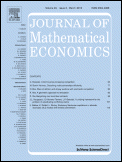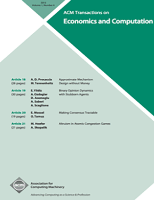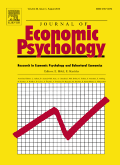
Games
Scope & Guideline
Advancing Game Theory with Innovative Research and Analysis.
Introduction
Aims and Scopes
- Game Theory Applications:
The journal focuses on the application of game theory to diverse domains, including economics, political science, environmental studies, and social dilemmas, thereby bridging theoretical concepts with real-world scenarios. - Experimental and Empirical Studies:
A significant portion of the research includes experimental and empirical investigations that test game-theoretic principles in controlled environments, offering insights into human behavior and decision-making. - Interdisciplinary Research:
The journal encourages interdisciplinary approaches, integrating insights from psychology, sociology, and economics to enrich game-theoretic models and enhance their applicability to complex social phenomena. - Methodological Innovations:
Innovative methodologies, such as computational modeling, machine learning applications, and advanced statistical techniques, are frequently explored to advance the analytical capabilities within game theory. - Focus on Fairness and Cooperation:
Research addressing issues of fairness, cooperation, and social norms within game-theoretic frameworks is emphasized, reflecting the journal's commitment to understanding collective behavior and resource allocation.
Trending and Emerging
- Cybersecurity and Strategic Defense:
An increasing number of papers are addressing game-theoretic approaches to cybersecurity, focusing on strategic interactions among attackers and defenders, which is vital given the rising threats in digital environments. - Behavioral Game Theory:
There is a growing trend towards incorporating behavioral insights into game theory, exploring how psychological factors influence decision-making and strategy formulation among players. - Sustainability and Environmental Economics:
Research applying game theory to sustainability challenges and environmental economics is on the rise, reflecting a global emphasis on addressing climate change and resource management through cooperative strategies. - Machine Learning and AI Integration:
The integration of machine learning techniques with game-theoretic modeling is emerging as a significant theme, facilitating the analysis of complex strategic interactions in various fields, including economics and social sciences. - Social Norms and Institutional Influences:
Emerging studies are increasingly focusing on the role of social norms and institutional frameworks in shaping strategic interactions, emphasizing the importance of context in understanding cooperative behavior.
Declining or Waning
- Traditional Economic Models:
There has been a noticeable decline in the publication of papers focused solely on traditional economic models of game theory, as researchers increasingly seek to incorporate behavioral and experimental insights into their analyses. - Static Game Analysis:
Research centered around static games, particularly those without consideration of dynamic elements or evolving strategies, is becoming less prevalent as the community shifts towards more complex, dynamic frameworks. - Oversimplified Assumptions:
Papers that rely on oversimplified assumptions about rationality or homogeneity among players are appearing less frequently, as there is a growing recognition of the need for more nuanced models that reflect real-world complexities. - Purely Theoretical Constructs:
Theoretical explorations that do not connect to empirical findings or real-world applications are seeing a decline, as the journal increasingly favors research that demonstrates practical relevance.
Similar Journals

INTERNATIONAL JOURNAL OF GAME THEORY
Fostering Intellectual Discourse in Game TheoryINTERNATIONAL JOURNAL OF GAME THEORY, published by Springer Heidelberg, is a distinguished journal dedicated to the rigorous exploration of game theory across multiple disciplines, encompassing economics, mathematics, social sciences, and statistics. Established in 1971, this journal has become a pivotal resource for scholars and practitioners seeking to deepen their understanding of strategic interactions and decision-making processes. With ISSN 0020-7276 and E-ISSN 1432-1270, the journal spans its focus on theoretical advancements and practical applications in game theory. The journal currently ranks in the Q2 and Q3 quartiles across various categories, reflecting its impact and relevance in the academic community. Although not an open-access journal, it continues to provide invaluable insights for researchers, professionals, and students aiming to advance their knowledge in this critical area of study. The journal's commitment to fostering intellectual discourse is evident through its comprehensive coverage of topics relevant to modern-day challenges, positioning itself as an essential platform in the academic landscape.

THEORY AND DECISION
Transforming Theories into Practical Solutions for Today's ChallengesTHEORY AND DECISION is a prestigious academic journal published by SPRINGER, which has been a cornerstone of interdisciplinary research since its inception in 1970. With an ISSN of 0040-5833 and an E-ISSN of 1573-7187, this journal offers valuable insights into a range of fields, including Applied Psychology, Decision Sciences, Economics, and more. Holding a remarkable position within various quartile rankings, such as Q1 in Arts and Humanities and Q2 in Economics, it signifies the journal's impact and relevance in modern academic discourse. Although not presently open access, it remains accessible to researchers and institutions that prioritize impactful studies and theoretical advancements. The journal's objectives include exploring decision-making processes and theoretical underpinnings that inform practical applications across disciplines, making it an essential resource for academics, professionals, and students dedicated to advancing knowledge in their respective fields. THEORY AND DECISION continues to shape the landscape of interdisciplinary research, providing a platform for innovative ideas and discussions that are crucial in today’s complex world.

Journal of Dynamics and Games
Fostering Collaboration in Dynamics and Game TheoryJournal of Dynamics and Games is a premier publication dedicated to advancing the fields of Applied Mathematics, Modeling and Simulation, and Statistics and Probability. Published by the American Institute of Mathematical Sciences (AIMS), this journal serves as a critical platform for researchers, professionals, and students to disseminate innovative theoretical findings and practical applications. With an ISSN of 2164-6066 and an E-ISSN of 2164-6074, it has gained recognition within its field, currently positioned in the Q3 quartile across various categories according to the latest evaluations from 2023. This multidisciplinary journal, running from 2014 to 2024, allows for a rich exchange of ideas and promotes the integration of mathematical theories in complex dynamical systems and games. Although it does not offer an open access option, its rigorous peer-review process ensures high-quality research papers, fostering an academic environment conducive to innovation and collaboration.

Statistics and Applications
Unlocking the Potential of Statistics in Real-World Applications.Statistics and Applications is an esteemed academic journal dedicated to disseminating innovative research findings and advancements within the field of statistics and its diverse applications. Published by SOC STATISTICS COMPUTER & APPLICATIONS, this journal operates under an open access model, ensuring that critical knowledge and research are freely available to researchers, professionals, and students worldwide. With an ISSN of 2454-7395, it serves as a key platform for scholars to share their insights on statistical methodologies, computational techniques, and novel applications across various disciplines. Although the journal’s impact factor is not currently listed, its commitment to rigorous peer review and high-quality publications positions it as a valuable resource in the continuously evolving domain of statistics. By fostering collaboration among researchers and encouraging the sharing of knowledge, Statistics and Applications contributes significantly to the advancement of statistical science and its applications in real-world problems.

JOURNAL OF MATHEMATICAL ECONOMICS
Transforming Economic Theory with Mathematical Innovation.JOURNAL OF MATHEMATICAL ECONOMICS, published by Elsevier Science SA, is a premier journal that bridges the gap between mathematics and economics, making significant contributions to both fields since its inception in 1974. This journal is dedicated to publishing high-quality research that applies mathematical methods to solve complex economic problems, thus nurturing an interdisciplinary dialogue essential for advancing both theoretical and practical applications in economics. With an impact factor that reflects its esteemed position (Q2 in Applied Mathematics and Economics and Econometrics as of 2023), the journal ranks prominently within its categories, promoting rigorous analysis and innovative methodologies. The Journal of Mathematical Economics invites contributions from researchers, professionals, and students alike, providing a platform for the dissemination of cutting-edge research that shapes economic thought and policy. Operating without open access, it remains a crucial resource for anyone keen to delve deeper into the mathematical foundations of economic theory, while it continues to evolve and maintain relevance through 2024 and beyond.

ACM Transactions on Economics and Computation
Pioneering Research at the Crossroads of Data and EconomicsACM Transactions on Economics and Computation, published by the Association for Computing Machinery, is a premier scholarly journal that bridges the fields of economics and computation. With an ISSN of 2167-8375 and an E-ISSN of 2167-8383, this journal has carved out a significant niche since its inception in 2013, and is set to run through 2024. Its multidisciplinary scope encompasses various quarters, being ranked Q1 in Computer Science (miscellaneous) and Q2 in Computational Mathematics, Economics and Econometrics, Marketing, and Statistics and Probability as of 2023. The journal not only ranks impressively in Scopus—positioned within the top 25% for several categories—but also fosters a collaborative environment where researchers, professionals, and students can engage with cutting-edge research that showcases innovative methodologies and theoretical advancements. Although it is not open access, the journal remains vital for advancing knowledge at the intersection of computation and economics, making it an essential resource for those looking to understand the complexities of these dynamic fields.

JOURNAL OF ECONOMIC PSYCHOLOGY
Innovating Understanding of Economic Behavior Through Psychological LensesThe Journal of Economic Psychology is a premier academic publication dedicated to advancing the understanding of the interrelations between economic behaviors and psychological processes. Published by Elsevier, this journal has established itself as a critical resource for researchers and practitioners in the fields of *Applied Psychology*, *Economics and Econometrics*, and *Sociology and Political Science*, boasting an impressive *Q1* ranking in each category as of 2023. Since its inception in 1981 and with a commitment extending to 2024, the journal provides a platform for high-quality, peer-reviewed research that influences both theoretical frameworks and practical applications. With a rich interdisciplinary approach, the journal addresses pressing issues at the intersection of economics and psychology, facilitating a deeper understanding of how psychological factors drive economic decisions. Researchers looking to share innovative findings, as well as professionals seeking to implement evidence-based practices, will find the *Journal of Economic Psychology* an invaluable asset in their work. The emphasis on rigorous methodologies and relevant topics makes this journal not just a repository of knowledge, but a beacon for future studies that link economic and psychological insights.

International Game Theory Review
Pioneering Research in Rational Decision-MakingInternational Game Theory Review, published by World Scientific Publishing Co. Pte Ltd, serves as a vital platform for scholars and practitioners interested in the interdisciplinary domain of game theory and its applications across multiple fields including business, computer science, and statistics. With an ISSN of 0219-1989 and an E-ISSN of 1793-6675, this journal features innovative research and theoretical advancements that analyze strategic interactions among rational decision-makers. Despite its current positioning in the Q4 category across various quartiles for 2023, the journal is rapidly evolving, contributing to the global discourse in game theory and its varied applications. As it continues to publish cutting-edge articles until 2024, the International Game Theory Review remains a critical resource for researchers, professionals, and students aiming to enhance their understanding of strategic decision-making frameworks. Stay updated with access options via the publisher's website for the latest research findings that shape the future of this dynamic field.

JOURNAL OF MATHEMATICAL SOCIOLOGY
Bridging Mathematics and Society.JOURNAL OF MATHEMATICAL SOCIOLOGY, published by Taylor & Francis Inc, is a vital forum for interdisciplinary research at the intersection of mathematics and sociology, offering a unique perspective on social phenomena through mathematical analysis. Established in 1971, this esteemed journal is continuously evolving, with convergence through 2024, reflecting its commitment to advancing the field. With an ISSN of 0022-250X and an E-ISSN of 1545-5874, it is recognized for its impact in the realm of algebra and number theory, as indicated by its placement in Q3 for 2023. Additionally, it holds Q2 rankings in both Social Sciences (miscellaneous) and Sociology and Political Science, demonstrating its scholarly relevance. With a competitive ranking in Scopus, including a 92nd percentile in Mathematics, this journal caters to researchers, professionals, and students seeking rigorous mathematical tools to illuminate sociological concepts. While currently not open access, it remains a crucial resource for anyone looking to explore the quantitative methodologies that underpin modern sociology.

SOCIAL CHOICE AND WELFARE
Illuminating Pathways in Social Choice TheorySOCIAL CHOICE AND WELFARE is a prestigious academic journal published by Springer, dedicated to advancing the field of social choice theory and welfare economics. With its foundation dating back to 1984, the journal has made significant contributions to theoretical and applied research, becoming a leading platform for the dissemination of innovative ideas. It holds an impressive categorization in 2023, ranking in Q2 for Economics and Econometrics and Q1 for miscellaneous Social Sciences, reflecting its dual impact across these vital disciplines. The journal's Scopus ranking further highlights its influence, situated within the 57th percentile in Social Sciences (miscellaneous) and the 34th percentile in Economics, Econometrics, and Finance. Researchers, professionals, and students can access a wealth of knowledge without open access barriers, as it combines rigorous peer-reviewed articles with important theoretical developments. Its contribution to understanding societal preferences and resource allocation makes it an essential read for those engaged in economic and social research.